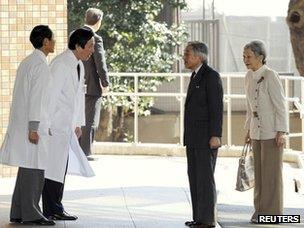Japanese Emperor Akihito's heart surgery 'a success'
- Published

Emperor Akihito was accompanied by his wife Empress Michiko when he checked into hospital
Japan's Emperor Akihito has undergone a successful heart bypass operation at a hospital in Tokyo, the palace says.
The 78-year-old head of state's surgery lasted just over five hours at the University of Tokyo Hospital.
The emperor, who has suffered from poor health in recent months, plays a largely ceremonial role but is respected deeply by many Japanese.
He ascended the throne in 1989 following the death of his father, Emperor Hirohito.
Emperor Akihito was accompanied by his wife Empress Michiko when he checked into the hospital on Friday morning.
The operation began at around 09:30 (00:30) on Saturday and ended at around 15:30.
"The operation went smoothly as planned," one of the three surgeons, Minoru Ono, told a news conference. "We confirmed a sufficient blood flow back in the arteries."
The emperor had reportedly nodded and told his wife and daughter "it feels good" as he emerged from the effects of the anaesthetics.
But another surgeon, Atsushi Amano, said it was too early to talk confidently of the operation's success, saying it would be "measured by whether the emperor can regain the normal lifestyle he had wished for".
"We are looking forward to that day, but until then, we'll use the word success sparingly," he said.
Emperor Akihito is expected to remain in hospital for about two weeks, during which time his first son Crown Prince Naruhito will handle official duties.
Prostate cancer
Doctors decided to carry out the operation after tests earlier this month showed his heart condition had worsened since a year ago.
Dr Ono said two of the three coronary arteries were repaired using a blood vessel from another part of his body.
Last year, Prince Akishino, who is second in line to the throne, called for debate on a retirement age for the head of state, who spent almost three weeks in hospital in November 2011.
Emperor Akihito also had surgery for prostate cancer in 2003 and suffered stress-related health issues in late 2008.
In 2009, the Imperial Household Agency said he would cut back on official duties such as speeches and meeting foreign dignitaries.
Under Japan's 1947 Imperial House Law, the emperor is succeeded on his death by a male relative. Crown Prince Naruhito is first in line to the throne, followed by his younger brother Prince Akishino.
Women cannot inherit the Japanese throne and so Princess Aiko, the daughter of Crown Prince Naruhito, cannot succeed her father.
Third in line to the throne is Prince Hisahito, Prince Akishino's son.
- Published30 November 2011
- Published24 November 2011
- Published6 November 2011
- Published27 April 2011
- Published16 March 2011